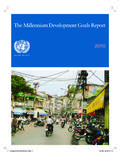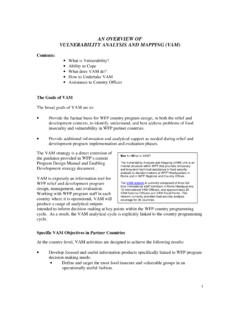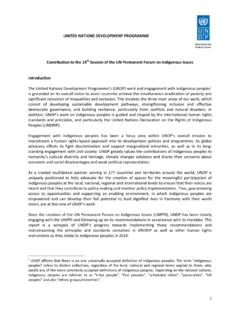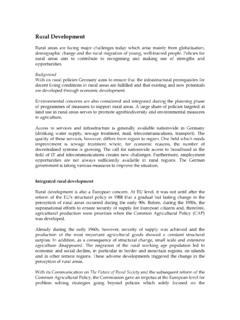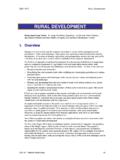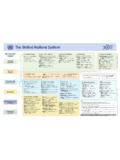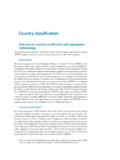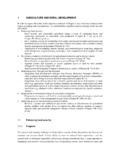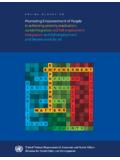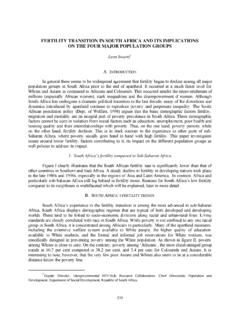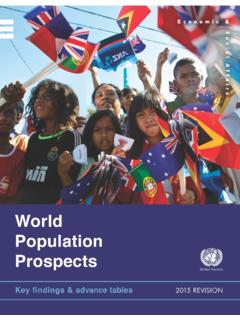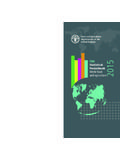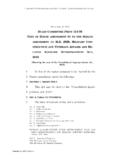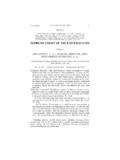Transcription of 15 12980 - United Nations
1 15 12980 . 1 10/08/ 2015 2:02:22 PM. Addis Ababa Action Agenda of the Third International Conference on Financing for Development (Addis Ababa Action Agenda). The final text of the outcome document adopted at the Third Internatinal Conference on Financing for Development (Addis Ababa, Ethiopia, 13 16 July 2015 ) and endorsed by the General Assembly in its resolution 69/313 of 27 July 2015 . asdf United Nations New York, 2015 . For more information, please contact: United Nations Department of Economic and Social Affairs Financing for Development Office E-mail: Website: Addis Ababa Action Agenda of the Third International Conference on Financing for Development Contents Chapter Paragraphs Page I. A global framework for financing development post- 2015 .. 1 19 1. II. Action areas .. 20 124 10. A. Domestic public resources .. 20 34 10. B. Domestic and international private business and finance .. 35 49 17.
2 C. International development cooperation .. 50 78 26. D. International trade as an engine for development .. 79 92 37. E. Debt and debt sustainability .. 93 102 43. F. Addressing systemic issues .. 103 113 46. G. Science, technology, innovation and capacity-building .. 114 124 51. III. Data, monitoring and follow-up .. 125 134 58. iii I. A global framework for financing development post- 2015 . 1. We, the Heads of State and Government and High Representatives, gathered in Addis Ababa from 13 to 16 July 2015 , affirm our strong political commitment to address the challenge of financ- ing and creating an enabling environment at all levels for sustain- able development in the spirit of global partnership and solidarity. We reaffirm and build on the 2002 Monterrey Consensus and the 2008 Doha Declaration. Our goal is to end poverty and hunger, and to achieve sustainable development in its three dimensions through promoting inclusive economic growth, protecting the environment, and promoting social inclusion.
3 We commit to respecting all human rights, including the right to development. We will ensure gender equality and women's and girls' empow- erment. We will promote peaceful and inclusive societies and advance fully towards an equitable global economic system in which no country or person is left behind, enabling decent work and productive livelihoods for all, while preserving the planet for our children and future generations. 2. In September 2015 , the United Nations will host a summit to adopt an ambitious and transformative post- 2015 development agenda, including sustainable development goals. This agenda must be underpinned by equally ambitious and credible means of implementation. We have come together to establish a holis- tic and forward-looking framework and to commit to concrete actions to deliver on the promise of that agenda. Our task is threefold: to follow-up on commitments and assess the progress made in the implementation of the Monterrey Consensus and the Doha Declaration; to further strengthen the framework to finance sustainable development and the means of implemen- tation for the universal post- 2015 development agenda; and to reinvigorate and strengthen the financing for development 1.
4 Follow-up process to ensure that the actions to which we commit are implemented and reviewed in an appropriate, inclusive, timely and transparent manner. 3. We recognize that since the adoption of the Monterrey Consensus the world has made significant overall progress. Globally, eco- nomic activity and financing flows have increased substantially. We have made great progress in mobilizing financial and tech- nical resources for development from an increased number of actors. Advances in science, technology and innovation have enhanced the potential to achieve our development goals. Many countries, including developing countries, have implemented policy frameworks that have contributed to increased mobiliza- tion of domestic resources and higher levels of economic growth and social progress. Developing countries' share in world trade has increased and, while debt burdens remain, they have been reduced in many poor countries.
5 These advances have contrib- uted to a substantial reduction in the number of people living in extreme poverty and to notable progress towards the achieve- ment of the Millennium Development Goals. 4. Despite these gains, many countries, particularly developing countries, still face considerable challenges, and some have fallen further behind. Inequalities within many countries have increased dramatically. Women, representing half of the world's population, as well as indigenous peoples and the vul- nerable, continue to be excluded from participating fully in the economy. While the Monterrey agenda has not yet been fully implemented, new challenges have arisen, and enormous unmet needs remain for the achievement of sustainable devel- opment. The 2008 world financial and economic crisis exposed risks and vulnerabilities in the international financial and eco- nomic system. Global growth rates are now below pre-crisis levels.
6 Shocks from financial and economic crises, conflict, natural disasters and disease outbreaks spread rapidly in our highly interconnected world. Environmental degradation, cli- mate change, and other environmental risks threaten to under- mine past successes and future prospects. We need to ensure that our development efforts enhance resilience in the face of these threats. 2. 5. Solutions can be found, including through strengthening public policies, regulatory frameworks and finance at all levels, unlock- ing the transformative potential of people and the private sector, and incentivizing changes in financing as well as consumption and production patterns to support sustainable development. We recognize that appropriate incentives, strengthening national and international policy environments and regulatory frame- works and their coherence, harnessing the potential of science, technology and innovation, closing technology gaps and scal- ing up capacity-building at all levels are essential for the shift towards sustainable development and poverty eradication.
7 We reaffirm the importance of freedom, human rights, and national sovereignty, good governance, rule of law, peace and security, combating corruption at all levels and in all its forms, and effec- tive, accountable and inclusive democratic institutions at the subnational, national and international levels as central to ena- bling the effective, efficient and transparent mobilization and use of resources. We also reaffirm all the principles of the Rio Declaration on Environment and Development. 6. We reaffirm that achieving gender equality, empowering all women and girls, and the full realization of their human rights are essential to achieving sustained, inclusive and equitable economic growth and sustainable development. We reiterate the need for gender mainstreaming, including targeted actions and investments in the formulation and implementation of all financial, economic, environmental and social policies.
8 We recommit to adopting and strengthening sound policies and enforceable legislation and transformative actions for the pro- motion of gender equality and women's and girls' empower- ment at all levels, to ensure women's equal rights, access and opportunities for participation and leadership in the economy and to eliminate gender-based violence and discrimination in all its forms. 7. We recognize that investing in children and youth is critical to achieving inclusive, equitable and sustainable development for present and future generations, and we recognize the need to support countries that face particular challenges to make the requisite investments in this area. We reaffirm the vital 3. importance of promoting and protecting the rights of all chil- dren, and ensuring that no child is left behind. 8. We recognize the importance of addressing the diverse needs and challenges faced by countries in special situations, in par- ticular African countries, least developed countries, landlocked developing countries and small island developing States, as well as the specific challenges facing middle-income countries.
9 We reaffirm that least developed countries, as the most vulnerable group of countries, need enhanced global support to overcome the structural challenges they face for the achievement of the post- 2015 development agenda and the sustainable development goals. We reaffirm the need to address the special challenges and needs of landlocked developing countries in structurally transforming their economies, harnessing benefits from inter- national trade, and developing efficient transport and transit systems. We further reaffirm that small island developing States remain a special case for sustainable development in view of their small size, remoteness, narrow resource and export base, and exposure to global environmental challenges. We also reaf- firm the need to achieve a positive socioeconomic transforma- tion in Africa, and the need to address the diverse and specific development needs of middle-income countries, including combating poverty in all of its forms.
10 In this regard, we support the implementation of relevant strategies and programmes of action, including the Istanbul Declaration and Programme of Action, the SIDS Accelerated Modalities of Action (SAMOA). Pathway and the Vienna Programme of Action for Landlocked Developing Countries for the Decade 2014-2024, and reaffirm the importance of supporting the new development framework, the African Union's Agenda 2063 , as well as its 10-year Plan of Action, as a strategic framework for ensuring a positive socio- economic transformation in Africa within the next 50 years and its continental programme embedded in the resolutions of the General Assembly on the New Partnership for Africa's Development (NEPAD). Countries in conflict and post-conflict situations also need special attention. We recognize the devel- opment challenge posed by conflict, which not only impedes but can reverse decades of development gains.
